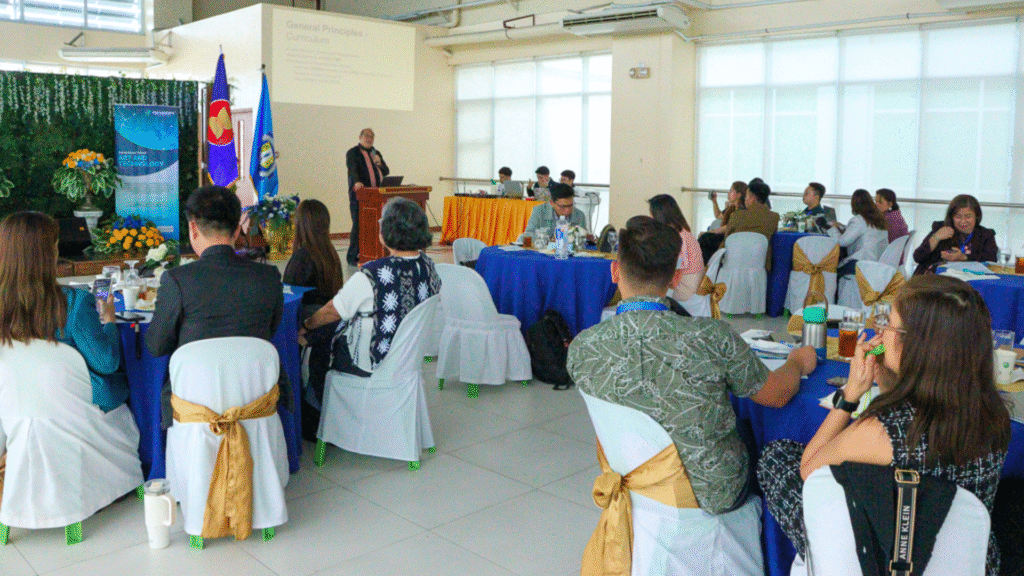MANDALUYONG CITY, Philippines – The Passage to ASEAN (P2A) Philippines Chapter held its 2025 General Assembly on October 20-21, 2025, at Rizal Technological University (RTU), focusing on the theme “Mobility Reimagined: Empowering Local Solutions, Strengthening ASEAN, and Connecting Beyond.” The two-day conference brought together academic leaders, researchers, and policymakers to address critical issues in regional educational mobility and international collaboration within the ASEAN framework and beyond.
The inaugural day commenced with welcome remarks from Dr. Magno M. Quendangan, Vice President for Research, Innovation, and Extension Services at RTU, followed by Dr. Engelbert C. Pasag, President of the P2A Philippines Chapter and representative to the Passage to ASEAN Association, who delivered the opening statement of objectives.
The morning program featured a keynote presentation by Dr. Amado L. Magsino on “The P2A Vision,” followed by a comprehensive lecture on P2A Philippines’ accomplishments and programs in local mobility, with regional breakout sessions engaging participants in mapping mobility opportunities across Luzon, Visayas, and Mindanao.
Afternoon proceedings included a lecture on artificial intelligence in education by Ms. Hysie Osit of EduClaas, and a panel discussion on global mobility in practice, featuring representatives from the Bureau of Immigration, Instr. Donato Estocada for his expertise on the Taiwan INTENSE Program, and representatives from universities in India and China.
The day concluded with presentations on innovation funding by Mr. Lucrecio C. Delgado, Jr., Regional Director for Southeast Asia at the Wadhwani Foundation, who discussed startups, entrepreneurship programs, and Atty. Lily Freida Milla, Deputy Executive Director and Head of the International Affairs Service Commission on Higher Education, addressed frameworks for collaboration and the internationalization of Philippine higher education institutions before the assembly elected new officers during the day’s final session.
The second day focused on collaborative project development through structured workshops. These workshops enabled participants to transform conceptual frameworks presented during Day One into concrete partnership proposals through group activities and template-based charter development.
Dr. Dong-Sung Cho, Professor of Strategy and International Management at Seoul National University, delivered the strategic keynote address on gaining global recognition, specifically discussing HLU and WURI ranking systems and WURI conferences.
Technical sessions included a spotlight on research empowerment by Dr. Kim Kyung-Sung, President of the AI Graduate School of Seoul National University of Science, who presented ISTAT as an alternative to SPSS for statistical analysis. Dr. Aldrin A. Darilag, former Commission on Higher Education Commissioner, addressed strategies for strengthening local networks by connecting universities across the Philippines in his strategic address.
The assembly concluded with an open forum and synthesis session where speakers discussed tools and strategies for collaboration, followed by concluding remarks from newly elected P2A Philippines officers who presented their vision for the way forward, and culminated in a memorandum of understanding signing ceremony that formalized new partnerships among participating institutions before the event concluded with a group photo.
The general assembly underscored P2A Philippines’ commitment to advancing educational mobility and fostering strategic partnerships that enhance ASEAN integration while extending collaborative networks to global academic communities.
The P2A Philippines 2025 General Assembly represents a pivotal moment in the advancement of regional academic cooperation, demonstrating the organization’s capacity to transform aspirational goals into actionable frameworks for institutional collaboration. By convening distinguished scholars, policymakers, and educational administrators from across ASEAN and beyond, the assembly reinforced the critical role of structured mobility programs in addressing contemporary challenges in higher education internationalization.
The formalization of new partnerships through memoranda of understanding, coupled with the election of new leadership committed to expanding P2A’s reach, signals a strengthened trajectory for Philippine higher education institutions seeking meaningful engagement within the global academic landscape.
As ASEAN continues to evolve as an integrated community, initiatives such as this assembly underscore the imperative of sustained dialogue, strategic planning, and collaborative action in building resilient educational networks that transcend geographical and institutional boundaries. The outcomes of this gathering will serve as a foundation for future endeavors aimed at reimagining mobility, empowering local solutions, and positioning Philippine universities as active contributors to regional and international knowledge exchange.






